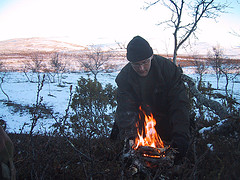9 Everyday Objects You can Re-purpose
8 February 2013
As stories of last week’s blizzard rolled across our screens, we’re reminded of the many freakish travel disasters people have endured in the recent past: cruise ships sinking, people trapped in their cars during blizzards, hurricanes, floods and more.
When a traveler finds him or herself in a disaster scenario and needs to survive, they may be looking around for everyday objects they can re-purpose to help them survive. Here are a few common, everyday objects you can re-purpose in a travel disaster survival scenario.
1. Ideal for binding other objects together – dental floss
Dental floss is ridiculously strong and can be used to bind other objects together, such as sticks to create some shelter from the elements. Dental floss has also been used to devise snares to catch small animals for food and as fishing line, but of course you’d need to re-purpose other objects to use as knives or fishing hooks as well (more on that later).
2. Ideal for straining water – a sock
The humble sock is a great tool in normal circumstances to protect your feet and keep you warm and dry, but in a survival situation you can also use your socks to strain water for drinking. It won’t get rid of bacteria or microscopic parasites like Giardia, however. So, if you can also boil the water, that’s still the safest.
3. Ideal as a breathing aid – a bandana
Many backpackers carry a bandana or two for protection from the sun or to cool them off when it’s hot, but in a survival situation, a bandana is also great as a breathing aid. In dusty, severe cold, or smoky conditions, it can be tied over your nose and mouth securely and your hands are free.
4. Ideal for drinking water storage – a condom
In a survival situation, water is critical to your ability to stay alive and a condom can hold as much as 1.5 liters of life-saving water. If you’re lucky enough to find drinkable water, a condom is a great way to store it and carry it. A condom can also be repurposed to hold other life-saving items and keep them dry (matches anyone?).
5. Ideal for creating warmth – garbage bags
Carried by hunters and hikers around the globe, large-sized garbage bags have a range of uses, but one of the most important may be keeping you warm. Staying warm and dry is at the top of the list of priorities when you’re in a survival scenario and have no access to shelter and heat. Plastic garbage bags can be quickly re-purposed as a rain jacket or sleeping bag and will keep body heat in while keeping rain and snow away.
Garbage bags can also be used to create shelter, hold water, as an emergency buoyancy device, and even burned for a signal fire.
6. Ideal for signalling for help – a soda can
When you’re waiting for rescue, signalling those who are looking for you helps them find you quicker and reflective objects – like the bottom of a soda can – reflects the sun well enough to be an effective signal to a rescue team.
Soda and beer cans can also be used to collect rainwater to drink or as a receptacle for your sock-filtered water.
7. Ideal for bandaging open wounds – a tampon
It’s rumored that soldiers carry these for bullet wounds. Depending on the shape of the wound, a tampon can be used either flattened out or rolled up to make an absorbent wound dressing for a makeshift field bandage.
Tampons can also be used as water filters if you also have a plastic water bottle. Fill the water bottle, then push the tampon into the neck of the bottle. Pour the water through the tampon to strain it.
8. Ideal as a fishing hook – hair clips and bobby pins
Many hair clips and bobby pins can be refashioned into a fishing hook (attach your dental floss as as a line). Scare up a little live bait like a bug or a worm and you’ve got a decent chance of landing a fish or frog for nourishment.
Necessity is the mother of all invention and when we’re thinking clearly and looking around to see what we can use to stay alive, we can find any number of common things that can be used in an emergency.
9. Ideal for making a fire
If you have a lighter or access to something reflective enough to concentrate the light of the sun, you can also start a fire. Don’t forget the wide array of ordinary objects that can be used to start a fire:
- old-fashioned camera film
- lint (look to your socks and sweaters for some)
- many hand sanitizers are flammable
- petroleum jelly
- many lip balms are also flammable
Of course, there are hard-core survivalists who can turn a wristwatch into a compass, or repurpose a broken cell phone into a knife blade, or turn a soda can tab into a fishhook as well but we’ll leave those ideas for the survival experts.
Damian Tysdal is the founder of CoverTrip, and is a licensed agent for travel insurance (MA 1883287). He believes travel insurance should be easier to understand, and started the first travel insurance blog in 2006.

